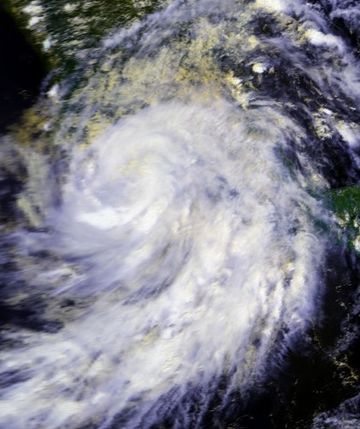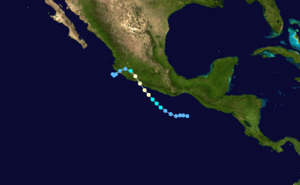Hurricane Boris (1996) facts for kids
| Category 1 hurricane (SSHWS/NWS) | |

Boris at landfall.
|
|
| Formed | June 27, 1996 |
|---|---|
| Dissipated | July 1, 1996 |
| Highest winds | 1-minute sustained: 90 mph (150 km/h) |
| Lowest pressure | 979 mbar (hPa); 28.91 inHg |
| Fatalities | 10 direct |
| Areas affected | Mexico |
| Part of the 1996 Pacific hurricane season | |
Hurricane Boris was a powerful and dangerous storm. It was the fourth tropical cyclone of the 1996 Pacific hurricane season. This storm started on June 27. During the night, it grew from a tropical depression into Tropical Storm Boris.
Soon after, Boris quickly became much stronger. It turned into a full hurricane. Just as the storm's eye began to form, Boris hit land in Mexico. Its strongest winds reached about 85 miles per hour (140 km/h). After hitting land, the hurricane quickly lost its strength. It finally ended on July 1. Hurricane Boris caused a lot of flooding in southern Mexico. Sadly, ten people died because of the storm.
Contents
How Hurricane Boris Formed and Moved
Hurricane Boris began as a tropical wave that moved away from Africa on June 8. It passed near the Cape Verde Islands. For many days, this wave was hard to see on satellite images.
Signs of a storm system appeared on June 26. It was about 250 miles south of the Gulf of Tehuantepec. The system officially became a tropical depression on June 27. This happened when bands of clouds and thunderstorms grew around its center.
At first, forecasters noticed it was getting more organized. They issued tropical storm warnings for Mexico. Models predicted it would hit Mexico as a weak tropical storm. The National Hurricane Center thought it would get stronger. They expected it to become Tropical Storm Boris and hit Mexico with winds of about 50 knots (93 km/h). Rain from the new storm had already started falling on Mexico.
The tropical cyclone moved northwest at 8 to 10 knots for two days. It grew much stronger, from 25 knots to 80 knots, in just 36 hours. A rough eye appeared on satellite images just before it hit land on June 29. Its strongest winds were about 85 knots (157 km/h). This made Boris a moderate Category 1 hurricane.
The center of the storm crossed the southern coast of Mexico. It hit between Lazaro Cardenas and Acapulco. Boris quickly became weaker after hitting the mountains. It turned into a depression and moved southwest. The mountains of Mexico broke up the storm. It ended on July 1 after moving back over the ocean south of Puerta Vallarta.
Impact and Damage from Hurricane Boris
Hurricane Boris was generally well-predicted by weather forecasters. Warnings were issued as the storm approached Mexico. A tropical storm watch was put in place for the coast. This stretched from Manzanillo to Puerto Escondido on June 28. Later that day, the warning changed to a hurricane warning for some areas.
Deaths and Injuries
Hurricane Boris caused ten deaths directly. Three other people drowned nearby. Five fishermen also went missing. The storm caused heavy rain across the affected area.
Flooding and Destruction
The most rain fell in Guerrero. Coyuca de Benítez recorded 12.16 inches of rain. Paso de San Antonio had the highest total with 14.98 inches. This heavy rain caused the San Jeronimo River to flood. At least 5,000 people lost their homes because of the flooding.
The town of Tecpan was hit very hard by the storm. Many homes were destroyed there. One person died in Tecpan. The storm also flooded the lobbies of hotels along the coast. In Acapulco, a child died when a roof fell down.
Strong waves pushed fishing boats against a sea wall. The storm knocked down trees and business signs. Streets were flooded up to the level of car hubcaps. About 10,000 people were left without a home. At least 70 people were injured. Around 12 boats sank offshore.
Related pages
 | Janet Taylor Pickett |
 | Synthia Saint James |
 | Howardena Pindell |
 | Faith Ringgold |



